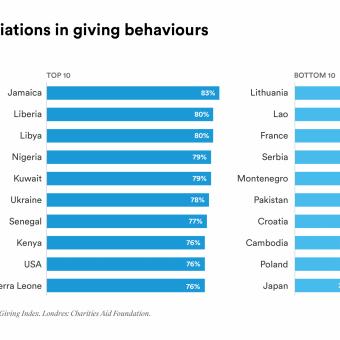
59% of Spaniards donated money to a charitable cause in 2024, with a median of 75 euros per person
08.05.25
7 minutes readThe study Philanthropy in Spain and Portugal. Social attitudes and behaviours, promoted by the Social Observatory of the ”la Caixa” Foundation, analyses the knowledge, social attitudes and philanthropic behaviour of Spaniards. Over the past year, the causes that received the most support were those related to social action, health, the environment and animals, human rights and research.
Some 59% of Spaniards made at least one donation to a charitable organisation in the past year, with the median of the annual declared donation being 75 euros per person and the mean annual reported donation 725 euros. The amount is presented in two forms (both median and mean) because it is common for many people to donate very small amounts and only a few to contribute larger sums, so the value that is considered to best reflect reality is the median (75 euros), which is the amount found at the mid-point.
The causes that received the most financial support in the past year were: social action (23.5% of Spaniards), health (22%), environment and animals (14.9%), human rights (13.2%) and research (12.2%). The first two are the most popular, as shown in the following chart:
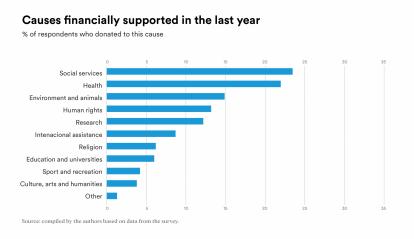
This is one of the findings of the study Philanthropy in Spain and Portugal. Social attitudes and behaviours, led by researcher Beth Breeze from the Centre for Philanthropy at the University of Kent, in collaboration with the Social Observatory of the ”la Caixa” Foundation.

The study presents data collected from a survey specifically commissioned to find out what Spanish and Portuguese citizens think about philanthropy and to assess their behaviour in this field. Conducted in April 2024, the survey gathers responses from 3,222 people, of whom 2,009 are from Spain and the remainder from Portugal.
«With this study, we wanted to find out what the citizens of Spain and Portugal think about philanthropy and assess their philanthropic behaviour. However, no existing data was available, so we designed a survey specifically for this purpose. The primary focus was on people, that is, to find out how society understands the role and impact of private donations, and the extent to which individuals engage through their own individual actions», explained Breeze.
Most popular philanthropic acts
Among the most popular philanthropic acts, it is noteworthy that 90% of Spaniards report having helped someone they know. Other key actions include donating products to a food bank or another organisation that distributes goods to those in need (80% of Spaniards), helping a stranger (77%), giving money to relatives, friends or acquaintances in need (74%), and giving money to a stranger in need (68%).
In addition to these actions, 65% of Spaniards have helped other people to do the shopping or walk a pet in the last year, while 59% have provided expert advice or a useful contact to someone. Lastly, two philanthropic acts performed by less than half of the population stand out: donating blood or plasma (43%) and lending something of value to someone the respondent does not know well (42%).
The following chart presents all the variables analysed:
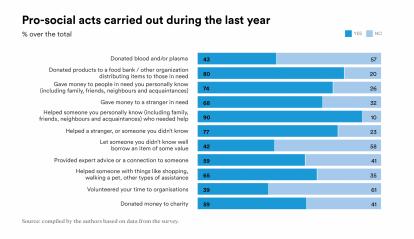
«The results show that Spaniards tend to engage in philanthropic acts in their daily lives. Most have carried out all the suggested actions at least once, and in some cases, on a weekly or monthly basis over the past year. However, people do not seem to be aware that their participation is a regular occurrence and that relatively high levels of altruistic behaviour exist across society», noted the study’s lead author.
When asked about the issues that should be addressed most urgently, 75.5% of Spaniards highlighted health-related topics, followed by research (61.8%), human rights (54.7%), education (51%), the environment and animals (45.9%), and social action (37.5%). The following chart illustrates all the issues analysed and the priority given to each:
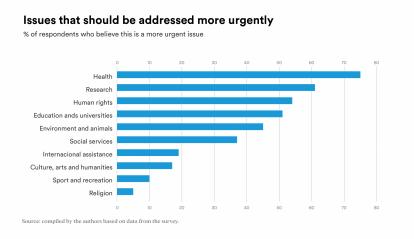
«Health and education are typically favourite causes across most countries but Spanish and Portugese donors are distinct in showing greater enthusiasm for supporting research and human rights», noted Beth Breeze.
Volunteering in charitable
organisations
The survey also examines the causes to which Spaniards dedicate their time as volunteers, an activity identified by 39% of respondents. The three most popular causes are health, social action and the environment and animals. This largely aligns with opinions on the most urgent issues, with health being the top priority.
«People with higher levels of education dedicate more time to volunteering, although this could be due to other factors, such as their workplace offering volunteering opportunities during working hours or having a higher income level that allows them to free up time», stated the study’s lead author.
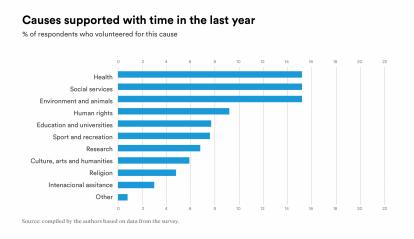
Knowledge about philanthropy
The study led by Beth Breeze in collaboration with the Social Observatory of the ”la Caixa” Foundation also analysed the level of public awareness about philanthropy in Spain. In this regard, the majority (60%) stated that they were familiar with the term, a probability that increases with age and educational level.
When asked to define the concept, four words were most frequently mentioned: help, love, humanity and generosity. Respondents also found it easier to name a philanthropic organisation than an individual. In this respect, in Spain, the ”la Caixa” Foundation, the Red Cross and Cáritas topped the list of the most frequently mentioned philanthropic organisations. They were followed by Unicef, Médecins Sans Frontières, Ayuda en Acción, the Gates Foundation, Save the Children, the Mapfre Foundation and The Coca-Cola Company.
The survey also asked respondents to rate the level of solidarity in Spanish society on a scale from 1 to 10, with the average response being 5.9 in Spain. «Although respondents perceive the level of solidarity in society as not particularly high, the actual figures on participation in various prosocial acts indicate that people are more philanthropic in their daily lives than they might think», says Breeze.
Institutional philanthropists
According to the Philanthropy Europe Association (Philea), Europe is home to an estimated 186,000 foundations, collectively holding 647.5 billion euros in assets and distributing approximately 54.5 billion euros annually. Notable examples of long-established European philanthropic foundations include the Fugger foundations in Germany (founded in 1521), the ”la Caixa” Foundation (founded in 1904), the Wellcome Trust in the United Kingdom (founded in 1936), and the Fundação Calouste Gulbenkian in Portugal (founded in 1956).
Historically, philanthropy has played a distinctive and unique role in society, separate from that of governments and markets. Specifically, philanthropy has greater freedom to act more swiftly and take on higher risks. This does not mean it operates in opposition to government action; on the contrary, they fulfil complementary functions.
«Philanthropy is needed alongside state spending because there is no limit to the existence of needs and ideas to improve the quality of life for individuals and communities. In many European countries, including Spain and Portugal, people feel strongly that essential services should be funded collectively through the tax system. However, people have different opinions about what counts as a ‘basic need’ and there are limits to public enthusiasm for higher tax rates. This is why private donations will continue to be essential for funding activity that governments cannot or will not pay for», stated Beth Breeze.
World Giving Index
The study also examines the findings of the World Giving Index, which is based on responses from nearly 150,000 people across 142 countries. One key result highlights that 72% of the global population either donated money or time or helped a stranger in 2022 (the most recent year for which data was collected). Over the past decade, the percentage of people reporting that they have helped strangers has seen the most significant increase, rising from 49% to 60%, while monetary donations have grown from 29% to 34%, and volunteering has increased from 22% to 24%.
According to this index, Spain ranks 86th in the overall classification, based on values such as 55% of Spaniards reporting that they have helped a stranger, 39% having donated money, and 17% having engaged in volunteer work.
The World Giving Index also reveals the following variations in donation-related behaviours across different countries:

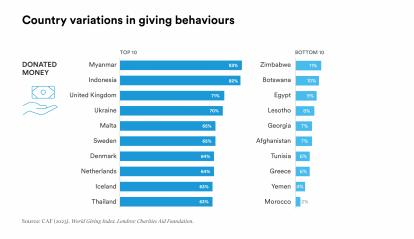
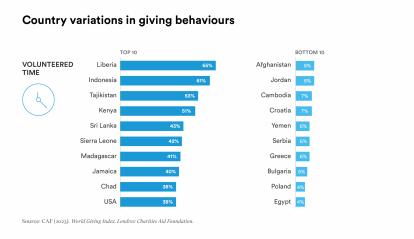
«This report provides much-needed data and insights into the patterns of charitable giving in Spain. It reveals many shared features of philanthropy that are in common with donors the world over, and also highlights some distinctive characteristics that are helpful in understanding the behaviours, expectations and attitudes in these countries», concluded the lead author.





